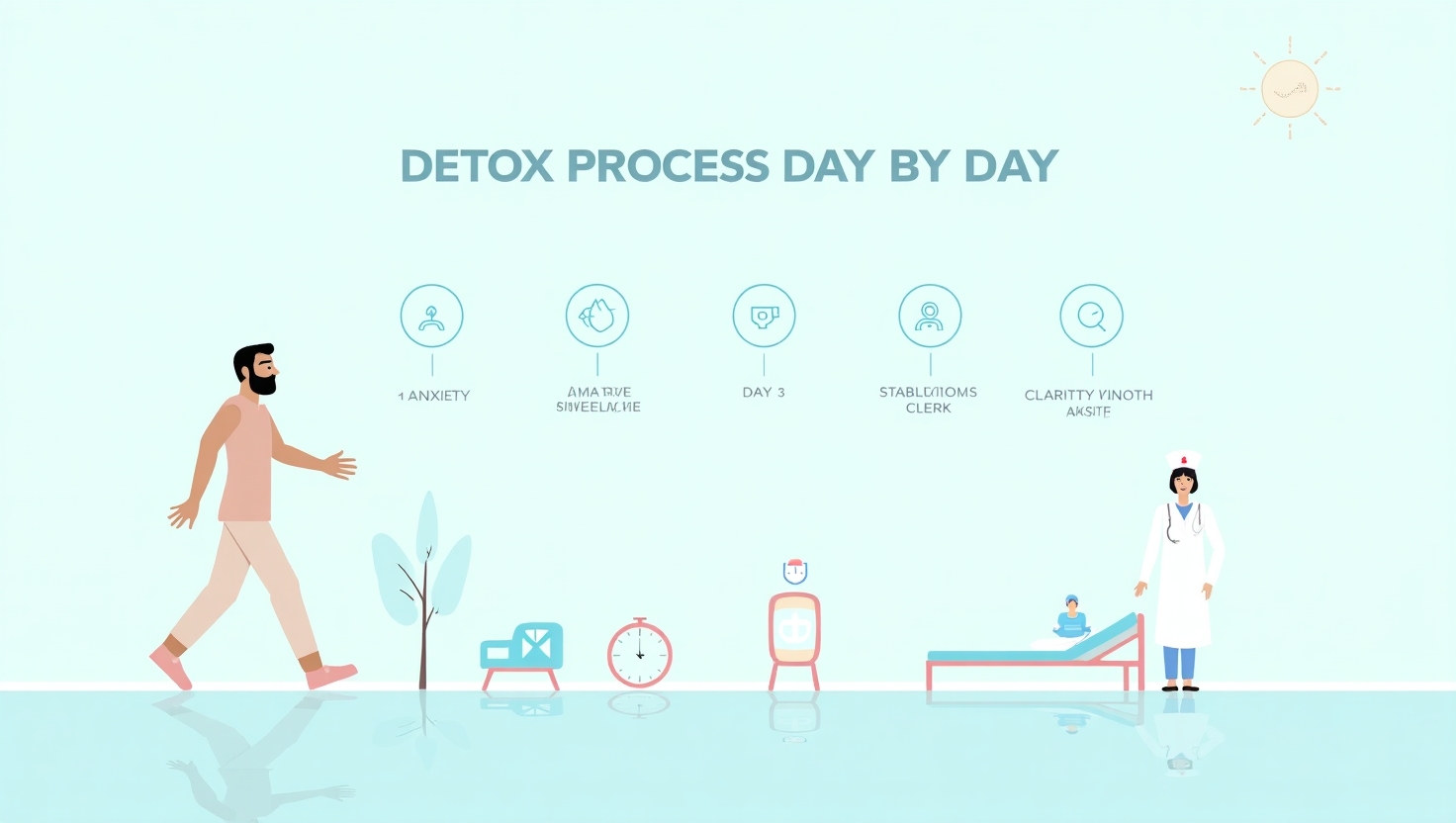If you’re considering detoxing from alcohol or drugs, one of the biggest fears is simply not knowing what to expect. Will it hurt? How long will it take? What happens on Day 1, Day 2, or even Day 5? These are real questions, and you deserve real answers.
Detox can feel overwhelming, but understanding the detox process day by day can make the journey less scary—and a lot more empowering. Whether you’re planning for yourself or supporting someone else, this guide will walk you through what really happens during detox, one day at a time.
What Is Detox?
Detoxification, or detox, is the process your body goes through when it clears itself of drugs, alcohol, or other harmful substances. It’s the first step in recovery—a physical reset that lays the foundation for long-term healing.
But let’s be real: detox isn’t always easy. Depending on what substance you’re detoxing from, your body and brain may go through withdrawal symptoms as it adjusts to functioning without the substance.
Why Detox Matters
Trying to quit “cold turkey” without support can be dangerous. Alcohol, opioids, and benzodiazepines (like Xanax or Valium) can have life-threatening withdrawal symptoms. That’s why medical detox is often recommended, especially for moderate to severe addiction.
Detox is also important because it clears the fog, making it easier to focus on the emotional and psychological work needed for true recovery.
Where Detox Happens: Home vs. Medical Detox
There are two main types of detox:
At-Home Detox (Not Recommended for Everyone)
Sometimes used for mild cases or with outpatient supervision
Risk of relapse or medical emergencies if symptoms become severe
Medical Detox (Highly Recommended)
24/7 monitoring by doctors and nurses
Medication support for comfort and safety
Immediate help if complications arise
Detox Day by Day: What to Expect
Everyone’s detox experience is unique, but here’s a general day-by-day breakdown for substances like alcohol, opioids, or stimulants:
Day 1: The Start (6–12 hours after last use)
You may still feel “okay” at first—but soon symptoms begin. For alcohol and opioids, this is when cravings and early withdrawal signs appear.
Symptoms May Include:
Anxiety or nervousness
Sweating
Mild shaking
Insomnia
Cravings
Medical staff will likely:
Take vitals (BP, temp, heart rate)
Ask about drug use history
Start hydration and mild medications
Emotional Feelings: Confused, scared, hopeful, or all three.
Day 2: Intensifying Symptoms
This is often the most difficult day. Your body starts reacting more strongly to the absence of substances.
Common Symptoms:
Nausea, vomiting, or diarrhea
Muscle aches
Stronger anxiety or depression
High blood pressure or rapid heart rate
Shakes, chills, or fever
What Happens Medically:
Medications like benzodiazepines or Suboxone may be used to manage symptoms
You’ll likely receive IV fluids or electrolytes
Nurses will monitor for seizures (especially in alcohol detox)
Day 3: The Peak
For many, this is the climax of withdrawal. It can be intense—but the good news is that it’s usually downhill from here.
Symptoms May Peak:
Hallucinations (alcohol detox)
Sweating profusely
Insomnia
Cravings at their worst
Emotional breakdowns or panic attacks
Medical staff will:
Offer calming meds, sedatives, or anti-nausea drugs
Encourage rest and hydration
Provide emotional reassurance
Day 4: Starting to Stabilize
Things start to improve. The worst physical symptoms subside. Emotionally, you may feel “weirdly empty” or even a little better.
What You Might Notice:
Better sleep (or at least rest)
Less body pain
Appetite slowly returning
Mood swings or guilt/shame emerging
Care Team Focus:
Light meals or snacks
Mental health check-ins
Light counseling or therapy intro
Day 5 and Beyond: Clarity Returns
By now, many people are through the worst of detox. You may feel mentally foggy, but physically more stable.
What Improves:
Energy levels begin rising
Anxiety starts to fade
Motivation to continue recovery may grow
Body feels cleaner, clearer
What Happens Now:
Discharge planning if in a short detox program
Referral to inpatient or outpatient rehab
Therapy sessions and goal setting
Common Detox Symptoms
Detox symptoms vary depending on the substance, but here’s a list of common physical and psychological effects:
Physical Symptoms:
Headaches
Shaking/tremors
Fatigue
Rapid heart rate
Sweating or chills
Gastrointestinal issues
Emotional/Psychological:
Depression
Anxiety or panic
Irritability
Intense cravings
Sleep disturbances
Hallucinations (in severe cases)
Medications Used During Detox
To ease the discomfort and risks of withdrawal, medical professionals may use:
Benzodiazepines (for alcohol, sedative detox)
Suboxone/Subutex (for opioid detox)
Methadone (opioids)
Clonidine (anxiety, high blood pressure)
Anti-nausea meds (Zofran, etc.)
Antidepressants or sleep aids
These don’t replace treatment—but they make detox safer and more humane.
How Long Does Detox Take?
It depends on:
The substance
How long you’ve used it
Your physical health
Whether you’re doing inpatient detox or at home
Average Timelines:
Alcohol: 5–7 days
Opioids: 5–10 days
Benzos: 10–14 days (tapered slowly)
Stimulants (meth, cocaine): 3–7 days
Even after detox, post-acute withdrawal symptoms (PAWS) can last weeks or months, especially with benzos or opioids. That’s why follow-up care is crucial.
What Comes After Detox?
Detox is just the first step. Real recovery begins after the body is clean.
Here’s what usually comes next:
Inpatient rehab (30–90 days)
Outpatient counseling
Therapy (CBT, trauma-focused, etc.)
Support groups (NA, AA, SMART Recovery)
Sober living homes
Think of detox like clearing the runway—now you’re ready for takeoff.
Tips for Getting Through Detox Safely
Never detox alone if you’ve been heavily drinking or using drugs for months/years
Hydrate constantly—water, Gatorade, or electrolytes
Ask for help—medical, emotional, or both
Prepare mentally—detox is temporary pain for long-term gain
Create a follow-up plan before starting
“Detox felt like the longest week of my life… but I survived. And now I have a second chance.” — a recovered addict
Final Words: You’ve Got This
If you’re still reading, it means you’re already doing something powerful: thinking about change. Detox is hard—but it’s also the beginning of a better, brighter, and healthier life.
Yes, it can be uncomfortable. Yes, it can be emotional. But detox doesn’t last forever—and the freedom that comes after is absolutely worth it.


